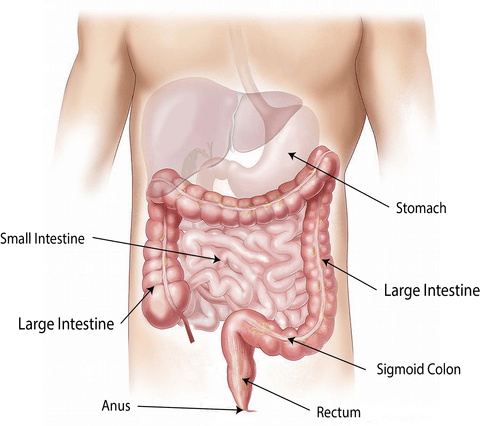

On the 19th of May, it is National IBD Day. IBD stands for Inflammatory Bowel Disease. It is the umbrella term for two bowel conditions: ulcerative colitis and Crohn’s disease.
So, with National IBD Day in mind, we have written a short guide to explain the symptoms of the two conditions and how doctors treat them.
Ulcerative colitis is the inflammation of the large intestine (the bowel) and the rectum. It starts when small ulcers appear in the lining of the colon. The ulcers sometimes bleed and can be full of pus.
You will have regular bouts of diarrhoea and you might see that your poo contains pus or blood. You’ll feel the need to empty your bowels more often than normal. You might also experience cramping pains in your stomach.
The condition can also make you feel tired with loss of appetite and weight loss.
Not usually, ulcerative colitis will come and go. You’ll have flare-ups which can also affect other parts of your body. You might show signs of inflammation in your joints, your eyes may be itchy, and you may have mouth ulcers. A gut infection might cause a flare-up, but nobody is really sure.
Yes. You should see your doctor as soon as you can. They will arrange for you to have a stool sample tested and may need to have a colonoscopy at your local hospital.
A colonoscopy is a small thin tube with a camera on the end. The doctor will place a thin tube into your rectum and goes inside your bowel. You will probably be offered a sedative to help you relax. The doctor can see in your bowel and may take a biopsy or remove polyps if you have them.
Once diagnosed with ulcerative colitis your doctor will prescribe medicines to help you with flare-ups. They include corticosteroids, immunosuppressants and aminosalicylates (ASAs). If your ulcerative colitis is severe you may need to have your colon removed and use a stoma bag instead.
Crohn’s disease has similar symptoms to ulcerative colitis. Like ulcerative colitis, it is an inflammatory bowel disease. It is a condition that affects parts of your digestive system.
Crohn’s disease symptoms can be continuous, or you may get flare-ups. Unfortunately, there isn’t a cure for Crohn’s disease, but there are treatments you can use to relieve the symptoms.
It’s not known what causes Crohn’s disease, although they don’t think a bad diet is a cause. There are some things though, which might be responsible, and these are:
From this list, only two causes might be helped by lifestyle changes. Trying to stop smoking is one change you can make. The second change is to treat your gut bacteria with a daily probiotic that you can take as yoghurt or a supplement.
There’s not a lot of evidence available about how probiotics treat Crohn’s disease, but it is thought that probiotics may help in restoring the gut’s natural balance, so it may help.
Ask your pharmacist about probiotic supplements so that you can take one that suits your requirements.

To provide the best experiences, we and our partners use technologies like cookies to store and/or access device information. Consenting to these technologies will allow us and our partners to process personal data such as browsing behavior or unique IDs on this site and show (non-) personalized ads. Not consenting or withdrawing consent, may adversely affect certain features and functions.
Click below to consent to the above or make granular choices. Your choices will be applied to this site only. You can change your settings at any time, including withdrawing your consent, by using the toggles on the Cookie Policy, or by clicking on the manage consent button at the bottom of the screen.